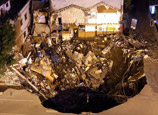
 |
| Young patients at the Capital Institute of Pediatrics in Beijing. Children and the elderly are more vulnerable to fl u viruses. (China Daily/ Wang Jing) |
Low awareness
Public awareness of flu has risen in tandem with the improvement in surveillance capability that followed the SARS outbreak of 2003, said Wang.
However, he conceded that understanding of the illness remains relatively limited, even among medical professionals.
Most outpatients have fevers, headaches and sore throats that may be attributable to flu, he said.
Wang Yan, the hospital's respiratory specialist, said she has to work a 24-hour shift on alternate days in response to the rising number of patients. "Sometimes, more than 30 people will be admitted after midnight," she said. "I am exhausted through lack of sleep."
Consulting a doctor is the wise choice for people with serious flu-like symptoms, she said, emphasizing the first 24 hours after the onset are crucial for effective treatment.
A World Bank study in 2008 estimated that a flu pandemic could cost $3 trillion and cause a roughly 5 percent drop in global GDP.
Also, at least 70 million people could die worldwide in a severe pandemic, it estimated.
During the 2003 SARS outbreak, the epidemic halted travel, trade and workplaces and cost the Asia-Pacific region $40 billion, according to the WHO. The six-month-long outbreak killed 775 people in 25 countries.
A study conducted by the China CDC in 2012 discovered that seasonal flu was responsible for more deaths in the country than had previously been thought. The study, based on data from eight cities with especially accurate mortality figures, showed that between 2003 and 2008, a large number of deaths that had originally been attributed to respiratory and circulatory failures were actually caused by flu and that in 86 percent of cases, the victims were aged 65 and older.
Also, unlike the United States where the H3N2 virus caused most flu-related deaths, the Influenza B virus led to most of the deaths on the Chinese mainland, according to the report.
Worryingly, most people in China mistook cases of flu for common colds, said He. That may be caused, in part, by a linguistic quirk, he said: In Mandarin flu is called liugan, which means "infectious cold" and is derived from the word for common cold. However, unlike the common cold, flu tends to produce more intense symptoms and much more serious complications or even death, according to He.
"That's the reason why we have to pay special attention to viral infections and carry out interventions to avert any extra deaths caused by a flu epidemic," he said.
Demand for inpatient care, particularly among the elderly and those with underlying chronic conditions, usually increases substantially in flu season, further straining limited medical resources and other related sectors, according to He.
An epidemic can take an economic toll through lost or reduced productivity, and also strain medical and related services, he warned.
Ma Anlin, deputy director of the department of infectious diseases at the China-Japan Friendship Hospital in Beijing, said the hospital's fever clinic is receiving an average of around 300 people a day, many more than earlier in the winter.


















 Buildings collapse after subsidence in S China
Buildings collapse after subsidence in S China


![]()
